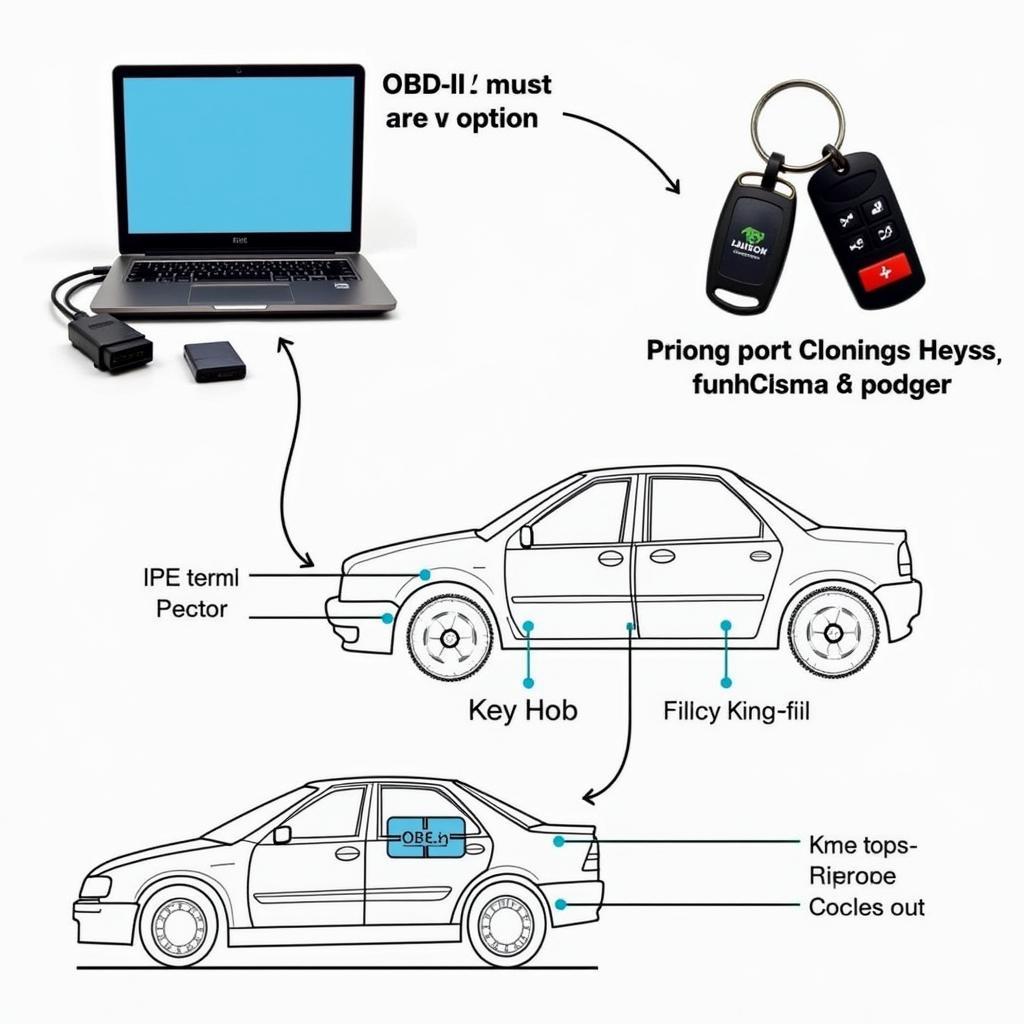That Car Hacking Tool you’ve heard whispers about—does it really exist? The world of automotive cybersecurity is a complex landscape, and the idea of a readily available “car hacking tool” is both intriguing and concerning. This article delves into the realities of car hacking, exploring the tools, techniques, and motivations behind these digital intrusions, and what you can do to protect yourself. what is kayak car hacking tool
Unmasking the Myths of the Universal Car Hacking Tool
While the idea of a single, all-powerful car hacking tool that unlocks any vehicle is a popular trope in movies and television, the reality is more nuanced. There’s no magical “one-size-fits-all” solution for car hacking. Different makes and models have varying vulnerabilities, and exploiting them requires specific knowledge and tools.
Types of Car Hacking Tools and Their Uses
Car hacking tools can range from simple software programs to sophisticated hardware devices. Some target the car’s key fob, exploiting vulnerabilities in the wireless communication protocols. Others might target the onboard diagnostic port (OBD-II) to access the vehicle’s internal network. Still others focus on manipulating the car’s electronic control units (ECUs) directly.
- Key fob hacking tools: These tools attempt to intercept or replicate the signal sent from your key fob to unlock and start your car.
- OBD-II hacking tools: These devices connect to the car’s OBD-II port, often used for diagnostics, and can be used to access and manipulate various systems.
- ECU hacking tools: These are more specialized tools that target the individual ECUs responsible for controlling various functions in the car, such as the engine, brakes, and steering.
 Types of Car Hacking Tools
Types of Car Hacking Tools
The Motivations Behind Car Hacking: Beyond Theft
While car theft is a significant concern, car hacking motivations extend beyond simply stealing vehicles. Some hackers are motivated by the challenge and the thrill of exploiting vulnerabilities. Others might be researchers seeking to improve automotive cybersecurity. And, unfortunately, some may use these tools for malicious purposes, such as disabling a vehicle or even causing an accident.
Protecting Your Vehicle from Digital Threats
Understanding the potential risks is the first step towards protecting your car from hacking. Staying informed about the latest vulnerabilities and security updates for your specific make and model is crucial.
- Regular software updates: Just like your computer or phone, your car’s software needs regular updates to patch security holes.
- Aftermarket security systems: Consider installing an aftermarket security system that can offer additional protection against hacking attempts.
- Key fob protection: Use a Faraday cage or similar device to block signals from your key fob, preventing relay attacks.
The Legal and Ethical Implications of Car Hacking Tools
The possession and use of car hacking tools are subject to legal restrictions. Even for research or educational purposes, it’s crucial to understand the legal landscape and operate within ethical boundaries. Unauthorized access to a vehicle’s systems can have serious consequences.
“Understanding the legal ramifications of using these tools, even for seemingly benign purposes, is paramount,” says Dr. Amelia Chen, a leading cybersecurity expert specializing in automotive systems. “The lines between research and criminal activity can be blurry, so it’s crucial to err on the side of caution.”
The Future of Car Security in a Connected World
As cars become increasingly connected, the potential attack surface for hackers grows. Manufacturers are constantly working to improve security measures, but staying ahead of potential threats is an ongoing challenge. The future of car security will likely involve a combination of advanced software, hardware, and even artificial intelligence to detect and prevent hacking attempts.
kayak car hacking tool tutorial
What are the common types of car hacking attacks?
Common attacks include key fob cloning, relay attacks, and exploiting vulnerabilities in the OBD-II port or the car’s software.
How can I tell if my car has been hacked?
Signs of a hacked car can include unexplained behavior, such as doors locking or unlocking on their own, the engine starting unexpectedly, or warning lights flashing erratically.
“Staying vigilant and aware of your car’s normal behavior is key to detecting any anomalies that could suggest a hacking attempt,” adds Dr. Chen. “If something seems off, don’t hesitate to seek professional help.”
In conclusion, understanding the landscape of that car hacking tool and the broader implications of car hacking is vital for both car owners and professionals in the automotive industry. While the threat is real, by staying informed and taking proactive steps, we can mitigate the risks and ensure the security of our vehicles in an increasingly connected world. buy car key fob hacking tools
FAQ
- Are all cars equally vulnerable to hacking? No, different makes and models have varying levels of vulnerability.
- Can I protect my car from hacking? Yes, staying informed, updating software, and using additional security measures can help.
- Is it legal to use car hacking tools? Generally, no, unless for authorized research or testing purposes.
- What should I do if I suspect my car has been hacked? Contact your car manufacturer or a qualified automotive security specialist.
- How can I learn more about car hacking and security? Reputable cybersecurity resources and automotive publications offer valuable information. how to use kayak car hacking tool
Need help with car diagnostic issues? Contact us via WhatsApp: +1(641)206-8880, Email: [email protected] or visit us at 910 Cedar Lane, Chicago, IL 60605, USA. We offer 24/7 customer support.

Leave a Reply